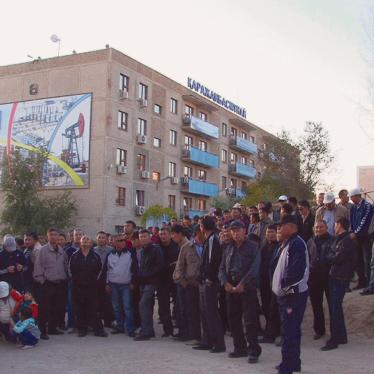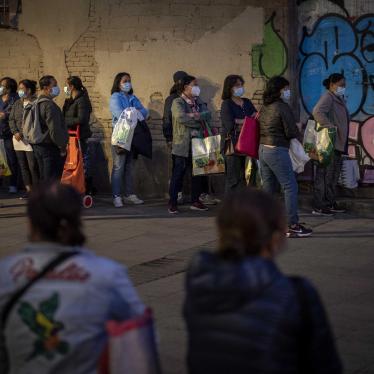(Almaty) – Repressive laws and abusive practices by the government and some oil companies violate the labor rights of thousands of workers employed in Kazakhstan’s booming petroleum sector, Human Rights Watch said in a report released today. Violent clashes in western Kazakhstan in 2011 following an extended strike by oil workers highlight a wider problem of disregard for workers’ rights and other human rights that should concern Kazakhstan’s trade and investment partners.
The 153-page report, “Striking Oil, Striking Workers: Violations of Labor Rights in Kazakhstan’s Oil Sector,” analyzes the tactics employed by Kazakh authorities and three companies operating in the oil and gas sector in western Kazakhstan to restrict workers’ rights to freedom of assembly, association, and expression leading up to and during peaceful labor strikes that began in May 2011. Local authorities broke the strike at one of the companies in June. Workers at the other two continued peaceful strikes until December 16, 2011, when clashes erupted between police and others, including striking oil workers, in Zhanaozen, a town in remote western Kazakhstan. Police shot 12 people dead in the clashes.
“Oil is fueling Kazakhstan’s growing economy, but the government and companies ignore the basic rights of workers who do the difficult and often dangerous work of bringing Kazakhstan’s oil to market,” said Mihra Rittmann, Central Asia researcher at Human Rights Watch and author of the report. “Workers’ rights are being trampled and they have nowhere to turn to resolve labor disputes.”
The developments have serious implications for foreign businesses and governments seeking to make investments in Kazakhstan, Human Rights Watch said. The European Union, which is seeking to upgrade relations with Kazakhstan, and a number of its member states that are heavily invested there, should be especially concerned and set benchmarks for human rights improvement.
The three companies named in the report are: KarazhanbasMunai JSC, a joint-venture between Kazakhstan’s state oil and gas company, KazMunaiGas Exploration and Production (KMG EP), and China’s state-owned CITIC group; Ersai Caspian Contractor LLC, an oil service company that is a partially-owned subsidiary of Italy’s Saipem S.p.A, part of the Eni group; and OzenMunaiGas, a fully-owned subsidiary of KMG EP.
The report is based on research during two field missions to western Kazakhstan in August and October 2011 and draws on 64 interviews with oil workers, including union activists, at the three companies and other experts. Human Rights Watch also contacted the companies. In response to letters sent by Human Rights Watch describing the findings and requesting each company’s response, Ersai Caspian Contractor and OzenMunaiGas each maintained that the companies had acted in accordance with national laws. KarazhanbasMunai JSC did not respond to Human Rights Watch’s letter.
In interviews with Human Rights Watch, workers at all three of the companies described human rights violations in the months leading up to and during the May 2011 strikes. The companies interfered in workers’ efforts to bargain collectively and carried out mass dismissals of workers following peaceful strikes, the workers said. The authorities tried to break peaceful strikes – in one instance using force – and imprisoned union leaders on politically motivated charges, not adhering to fair trial standards. Burdensome collective bargaining requirements and a broad prohibition on strikes that applies to workers in the oil sector under Kazakh law also obstruct exercise of workers’ rights, Human Rights Watch found.
One former Ersai Caspian Contractor worker described to Human Rights Watch how it felt to be a member of an independent union: “As for our union, the company completely ignored us. The company didn’t want a union that would open people’s eyes, that would provide legal consultation, that workers could [appeal to] to defend their rights. It’s easier for them when the workers don’t know anything, and just [did their] work, silently.”
Workers at all three companies repeatedly attempted to negotiate with company management to resolve wage and other contractual disputes but were met with indifference or outright harassment, they told Human Rights Watch. For example, workers said that KarazhanbasMunai and Ersai Caspian Contractor denied union leaders access to company grounds to speak to workers and hold union meetings. Officials at Ersai Caspian Contractor harassed and threatened workers for participating in a legitimate union meeting by interrogating them, in some cases joined by the police.
With their months-long efforts to resolve their disputes through negotiation thwarted, employees at these three companies in May 2011 began hunger and labor strikes, involving up to several thousand people at a time.
The right to strike is one of the principal ways workers and unions may promote and defend their interests, Human Rights Watch said. Yet, authorities interfered with the peaceful strikes, including by sentencing union leaders to up to 10 days of administrative detention. The authorities also brought criminal charges against an OzenMunaiGas oil worker and Natalia Sokolova, a union lawyer at KarazhanbasMunai, who in August 2011 was sentenced to six years in prison for speaking to oil workers about wage disparities. She was later released.
In all, more than 2,000 workers were dismissed from the three companies during the strikes. The International Labor Organization has said that retaliatory dismissals constitute illegal discrimination in employment.
“The oil workers have faced serious violations of their rights by both their employers and the government of Kazakhstan,” Rittmann said. “It’s shocking that workers should have to endure mass firings and being thrown in prison in retaliation for participating in a peaceful strike.”
Local authorities broke the strike at Ersai Caspian Contractor in late June 2011. In early July, law enforcement officers forcefully dispersed striking OzenMunaiGas workers, including beating one oil worker in the legs with a nightstick. Despite this interference, workers at OzenMunaiGas – as well as at KarazhanbasMunai – persisted with their peaceful labor strikes until December 16, when clashes broke out between police and people who had gathered on Zhanaozen’s central square.
On that day, unidentified men in oil company jackets charged a stage set up for Kazakhstan’s Independence Day celebration. Unidentified people set several buildings on fire and looted shops. The police and government forces, in response to the mayhem, opened fire on striking oil workers and others, killing 12 and wounding dozens, according to government numbers. Three other people died during the clashes and 35 police officers were injured.
In the aftermath of the violence, Kazakh authorities targeted the most outspoken oil workers and political opposition activists who supported them throughout their strikes. A high profile trial of opposition figures and an oil worker accused of instigating the December violence is ongoing in Kazakhstan. Under international human rights law, persuading fired workers to continue their peaceful protest action is a legitimate exercise of freedom of speech, Human Rights Watch said. Human Rights Watch has serious concerns that the trial is not adhering to international fair trial standards.
The rights to freedom of association, collective bargaining, and to strike are enshrined in International Labor Organization (ILO) conventions to which Kazakhstan is party. Company interference in workers’ efforts to bargain collectively and the mass dismissals in retaliation for staging peaceful strikes, as well as the authorities’ attempts to break the strikes and keeping broad prohibitions on strikes, all violate rights guaranteed under international law.
Human Rights Watch called on the Kazakhstan authorities to amend the labor code to bring it fully in line with international norms on collective bargaining, freedom of association, and the right to strike, and protect trade union activists and workers from national and multinational companies interfering in their union activities.
The authorities should also stop misusing criminal or other laws to prosecute legitimate union activity, Human Rights Watch said.
International businesses investing or operating in Kazakhstan, should ensure that their workers, or workers employed in their subsidiary companies or other business partners, enjoy basic rights to organize, bargain collectively, and strike. Companies should ensure that trade unions and workers do not face harassment or interference in activities aimed at protecting their rights and should ensure all workers are fully informed about their rights.
Kazakhstan’s international partners should insist that Kazakhstan adhere to international human rights and labor norms to which Kazakhstan is party. In particular, the European Union, with whom Kazakhstan is seeking to upgrade relations through an enhanced partnership and cooperation agreement, should set specific and measurable benchmarks for human rights improvement for Kazakhstan to comply with in exchange for enhanced relations.
In its recently adopted human rights action plan, the EU has pledged to “promote human rights in all areas of its external action without exception” in particular in “trade” and “investment.”
“The EU can do much more to promote protection of workers’ rights in Kazakhstan, where EU member states invest heavily,” Rittmann said. “Acting now will ensure that European companies are not benefiting from a poor rights climate for workers and lax government enforcement of labor laws.”
The protracted and unresolved labor disputes and strikes and the December violence in Zhanaozen were unprecedented in oil-rich Kazakhstan, which promotes itself as providing a stable investment climate and being a reliable trade partner. The government has spent significant resources cultivating this image, including hiring the former UK Prime Minister Tony Blair to advise the government on economic and other policies.
The developments have serious implications for foreign businesses and governments seeking to make investments in Kazakhstan, Human Rights Watch said.
“It’s risky to partner with a government that intimidates, harasses and jails workers who stand up for their rights,” Rittmann said. “Companies and governments that are interested in Kazakhstan because of its oil resources need to be aware of the human rights problems and take steps to make sure that the workers’ human rights are respected and to avoid involvement in abuses.”








